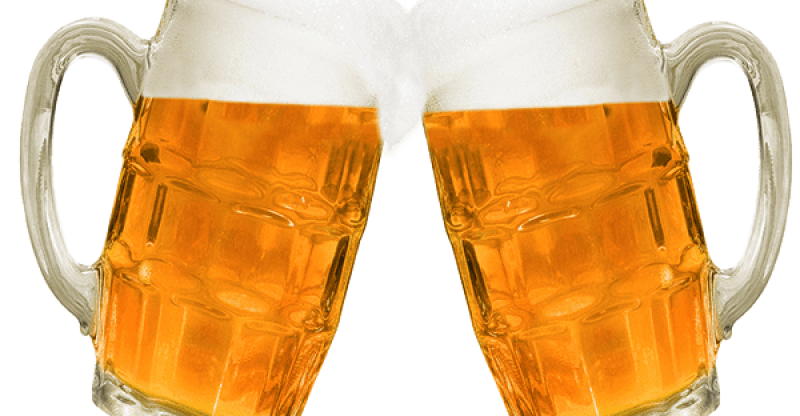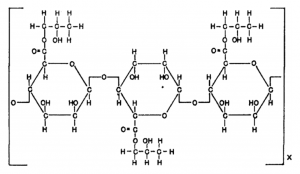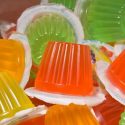What Is Propylene Glycol Alginate (E405) in Food? Uses, Safety, FAQs

Production | Specification | Property | Uses | Safety | FAQs
Propylene glycol alginate (abbreviation PGA) or propane-1,2-diol alginate, is an ester made from alginic acid (E400) and propylene glycol (E1520). PGA is a multi-purpose ingredient that can be used as a thickener, stabilizer and emulsifier in food such as in salad dressings, ice cream and beer. The European food additive number for it is E405. Generally, it is safe, synthetic, vegan, halal, kosher and gluten-free.
How is Propylene Glycol Alginate Made?
PGA can be produced by partial esterification of the carboxylic acid groups in alginic acid with propylene oxide, and alkaline as a catalyst in the temperature of approximately 70°C.
After the synthesis reaction, the final product is made of PGA, neutralized alginic acid, and free alginic acid. The esterification degree for use in food is requested not less than 85% by the FDA. Different food grades of PGA are based on the percentage of esterification and the following viscosity.
Specification
Appearance
Nearly odourless, white to yellowish-brown fibrous, granular or powder.
|
Other names |
|
|
CAS number |
9005-37-2 |
|
Chemical formula |
(C9H14O7)n |
|
Molecular weight |
10 000 -600 000 |
Structure

Image Source
Properties
Solubility
Cold water soluble
Viscosity
It’s a low viscosity thickener with the viscosity of 1% solution that varies from 25–500 mPas accompanied by the esterification degrees from 50% to 90%. And viscosity increases along with the esterification degree.
PH
It is stable in an acidic environment and the viscosity of its solution will not be affected by pH in the range of pH 2-10. However, it has a weak alkali resistance as it will be gradually hydrolyzed to propylene glycol and alginate ion in the alkaline environment.
What’re the Uses of Propylene Glycol Alginate?
The propylene glycol group in the molecule of PGA is a lipophilic end and can be combined with fats, so it has lipophilicity property. The uronic acid in the molecule is a hydrophilic end that contains numbers of hydroxyl groups and carboxyl groups, which can be combined with proteins. Therefore, PGA molecular has both hydrophilic and lipophilic groups, making it have good functions of emulsifying, stabilizing, and thickening. It is suitable to use in the following food:
- Dairy products
- Salad dressing
- Beer
- Acidic beverage, sports drinks, fruit drinks
- Frozen foods
- Bakery
- Jelly
Acidic Beverage
PGA is acid-stable and can be used in acidic beverages with pH 3-5, such as in lactic acid drinks and fruit juice drinks.
Beer
Propylene glycol alginate has good foaming and emulsifying ability and is widely used in beer foam stabilizers to increase beer foaming performance and make the foam stable and durable. According to Wikipedia, the famous beer manufacturer Corona also uses PGA as a stabilizer in its beer. (1)
Salad Dressing
PGA stabilizes oil and water in salad dressing and imparts a soft texture. It makes the salad dressing more uniform and stable. PGA increases the viscosity in low-fat salad dressing which has a low viscosity due to less fat content.
Ice Cream
PGA improves the dispersion stability of oil and fat solids in ice cream. Also, it improves the taste, appearance, and anti-melting properties of ice cream. In addition, PGA prevents the formation of lactose ice crystals.
Yogurt
Gelatin, carrageenan, pectin, starch and other thickeners can also be used in yogurt as a thickener and stabilizer to prevent syneresis. However, they exhibit several disadvantages compared with PGA:
- Gelatin is not accepted by vegetarians
- Carrageenan is not stable in acidic dairy products at low pH
- The addition of pectin will make the texture of yogurt hard and also brings the higher production cost
- Starch makes the yogurt taste too sticky and increases the calories
PGA is suitable for yogurt production as it
- imparts a natural texture to yogurt products,
- creates a smooth taste
- can be applied in the low pH range
- excellent in dispersibility and solubility
- stable during the heating process
Bakery
PGA improves bread taste and makes it soft and elastic by increasing the water absorption of the dough. Meanwhile, it slows down the aging of starch and prolongs the shelf life of bread.
Fruit Juice
The juice is easy to separate into two parts, the upper layer with clear and transparent water, and the bottom layer with pulp precipitation. Adding a small amount of propylene glycol alginate to the fruit juice can improve the stability of the pulp without separation.
Fragrance
PGA can be used as a flavor protector in food fragrance as it combines with most flavors, and effectively prevents flavor loss.
Synergy with other Thickeners
PGA has good synergy with sodium carboxymethyl cellulose, modified starch, sodium alginate, gum arabic, pectin, and etc.
Is Propylene glycol alginate Safe to Eat?
Yes, it has been approved as a safe ingredient by U.S. Food and Drug Administration (FDA), European Food Safety Authority (EFSA), as well as Joint FAO/WHO Expert Committee on Food Additives (JECFA).
FDA
Propylene glycol alginate may be used in following food list as a stabilizer, emulsifier, thickener, defoaming agent, flavoring adjuvant, formulation aid, or surfactant with the authorized use levels(2):
- Jams and jellies 0.4%
- Frozen dairy desserts, fruit and water ices, confections and frostings 0.5%
- Baked goods 0.5%
- Gravies and in sweet sauces 0.5%
- Gelatins and puddings 0.6%
- Condiments and relishes 0.6%
- Cheeses 0.9%
- Fats and oils 1.1%
- Seasonings and flavors 1.7%
EFSA
Propane-1,2-diol alginate (E405) is listed in Commission Regulation (EU) No 231/2012 as an authorised food additive and categorized in “Additives other than colours and sweeteners” (3).
Safety Revaluation in 2018
After the studies of subacute and subchronic, genotoxicity, carcinogenicity and others, EFSA concluded that there was no safety concern of E405 at the ADI of 55 mg/kg bw per day based on the ADI of propylene glycol (E1520) of 25 mg/kg bw per day. (4)
Approved uses
The following food may contains propylene glycol alginate with the maximum usage ranges from 100mg/kg to 10000mg/kg (5):
- Fat and oil emulsions water-based edible ices
- Fruit and vegetable preparations sugar confectionery
- Chewing gum
- Decorations, coatings and fillings
- Fine bakery wares
- Sauces
- Dietary foods for infants for special medical purposes and special formulae for infants
- Dietary foods for special medical purposes or for weight control diets
- Flavoured drinks, beer and malt beverages, cider and perry
- Emulsified liqueurs, fermented grape must-based drinks
- Cereal and potato-based snacks
UK Food Standards Agency
Categorized in “Others” (6)
Food Standards Australia New Zealand
It is an approved ingredient in Australia and New Zealand with the code number 405. (7)
JECFA
Function Class: food additives, emulsifier, thickener, stabilizer. (8)
Acceptable daily intake: Group ADI “70 mg/kg bw” set in 1993. (9)
Frequently Asked Questions
Is Propylene Glycol Alginate Halal?
Yes, PGA is halal that complies with the Islamic Law and fulfill the conditions of Halal. And we can find some manufacturers certificated with MUI halal.
Is Propylene Glycol Alginate Vegan?
Yes, it is vegan as animal products are not involved in the manufacturing process. So PGA can be added in the diet of vegetarians.
Difference between Propylene Glycol Alginate and Propylene Glycol?
When customers hear propylene glycol alginate in food, they’re scared the health problem as they associate it with propylene glycol which is used in antifreeze and mistaken it as other harmful chemicals. However, propylene glycol is a safe food additive and its function in antifreeze is as a solvent to bind with other components to keep the water from freezing.
Conclusion
Now I think you may have a good knowledge of the thickener – Propylene glycol alginate (E405), from the following aspects:
- Production process
- Uses
- Approved safety
- The difference with propylene glycol
What kinds of food labels have you found this ingredient in? Let me know in the comments.



Thanks for giving this kind of good information.
I found this additive in Walden Farms Raspberry Vinaigrette. I was at first shocked to see that and after reading
about it here, I feel somewhat safer. FYI – I don’t trust it, but my mother always said, what goes in your mouth is not
as important as what comes out…thanks for the detailed description.